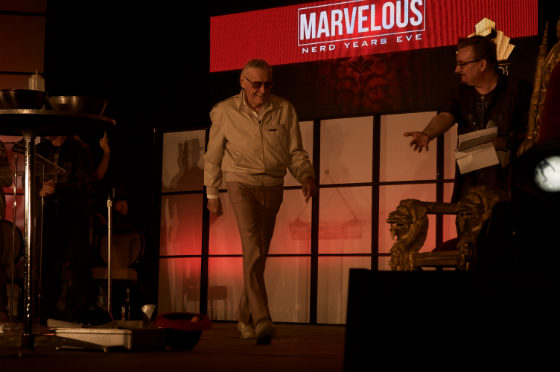Stan Lee: A Marvelous Legacy

The Man of the Hour at THE ROAST OF STAN LEE.

Since Shel Dorf and others founded the San Diego Comic Con in 1970, the popularity of science fiction, comic book, and special interest conventions (commonly “Cons”) has grown immensely. This past weekend, the Sheraton Dallas became host to the MARVELOUS NERD YEAR’S EVE convention. Included among the myriad discussion panels, photo ops and meet & greets was the celebration of Marvel Comics’ founder Stan Lee’s 94th birthday and several New Year’s Eve parties.
At a press conference on Dec. 29th, Lee opened, “What can I tell you that you don’t already know?”
The son of Romanian Jewish immigrants, Stanley Martin Lieber was born in New York City in 1922. Not by coincidence, some of his beloved characters, ranging from Spider-Man to Captain America, call New York home. Among his personal heroes, Lee counts Errol Flynn, who rose to stardom with Warner Bros. 1938 picture, THE ADVENTURES OF ROBIN HOOD. Apropos, Warners’ Robin Hood was perhaps the first cinematic franchise. The following year, Lee toiled as an assistant at Timely Comics which would by 1960 become Marvel Comics. In addition to rejecting the Comics Code Authority, Lee took a page from Campbell and, in stark contrast to Action/DC’s Superman, introduced us to relatable characters with a flawed humanity.
Whereas Lee and his creative partners at Marvel once held sway at the bleeding edge of the counterculture revolution in a manner not unlike the works of Melville, Godard, Truffaut, Cocteau and others of the French New Wave, the evolution of the Marvel Cinematic Universe today, wholly owned by Walt Disney Studios, seems to have succumbed to what Kael called “The Numbers”. In terms of box office alone, Marvel Cinematic Universe has pulled in $10.7 billion in a decade, compared to the $35 billion STAR WARS franchise that now spans 40 years. One can feel the pressure… none of which is heaped upon Lee who casually dismisses the Cinematic Universe as a responsibility/property from which he is far removed.
Fandom in the twenty-first century has moved beyond examining the struggles of the white, Jewish immigrant in Protestant America. As Washington Post contributor Michael Cavna noted in 2015, social media has shifted the dynamics of fandom to a point of gender parity, partly because nerd culture is pop culture. Whatever the reason or catalyst, here we are and yet I find myself loathing the fifteen minutes or so of CLERKS star Brian O’Halloran’s misogynistic jokes at Stan Lee’s Birthday Roast. Did he look out into the crowd to see the diverse audience to whom he’s playing?
Full disclosure: I’m the kind of nerd who had the Star Fleet Technical Manual schematics of every starship designed for the original series. However, I never understood the individuals who failed to see the forest through the trees. Gene Roddenberry’s STAR TREK was always about the human story. Science fiction and comics, especially Marvel comics, were always a vehicle for getting social commentary past media and government censors in times of social oppression.
The ongoing backslide of social discourse has led us to this moment: A narcissistic egomaniac whose own biographer deems a sociopath is now our President Elect. He wants to roll back every bit of progress women and minorities have made. Not so much out of any long-term vision for this country as bullet points to boast to his already-captive audience of intellectually bankrupt devotees. As I chatted casually with STAR TREK screenwriter David Gerrold, I wondered, what role will conventions play in the twilight of the Republic and the dawn of new fascism?
When asked what his greatest wish at 94 was, Stan Lee replied, “To have a 95th!” That’s something to fight for. So is inclusiveness. So are the values that elevated Marvel to prominence. The arts and entertainment have always been vessels of social commentary, and to abrogate that responsibility is to resign ourselves to the belief that we, as humans, as fans of fiction, cannot live up to the ideals of our heroes… be they Captain America or Errol Flynn.